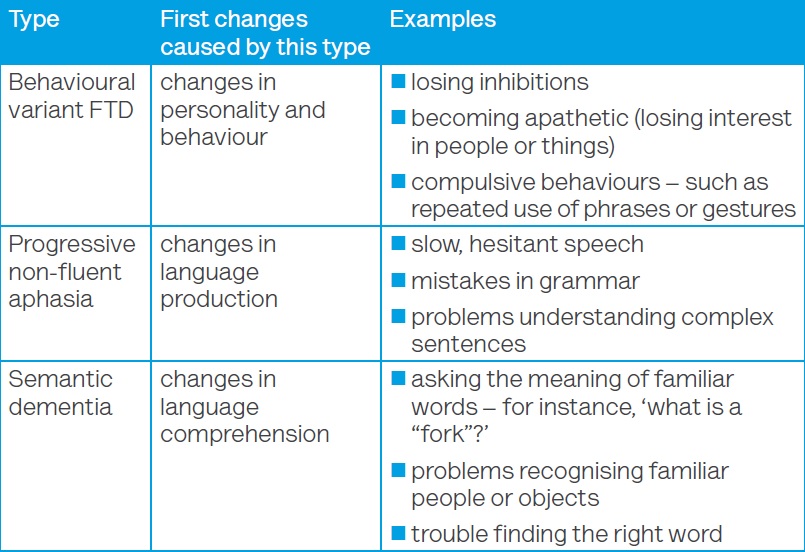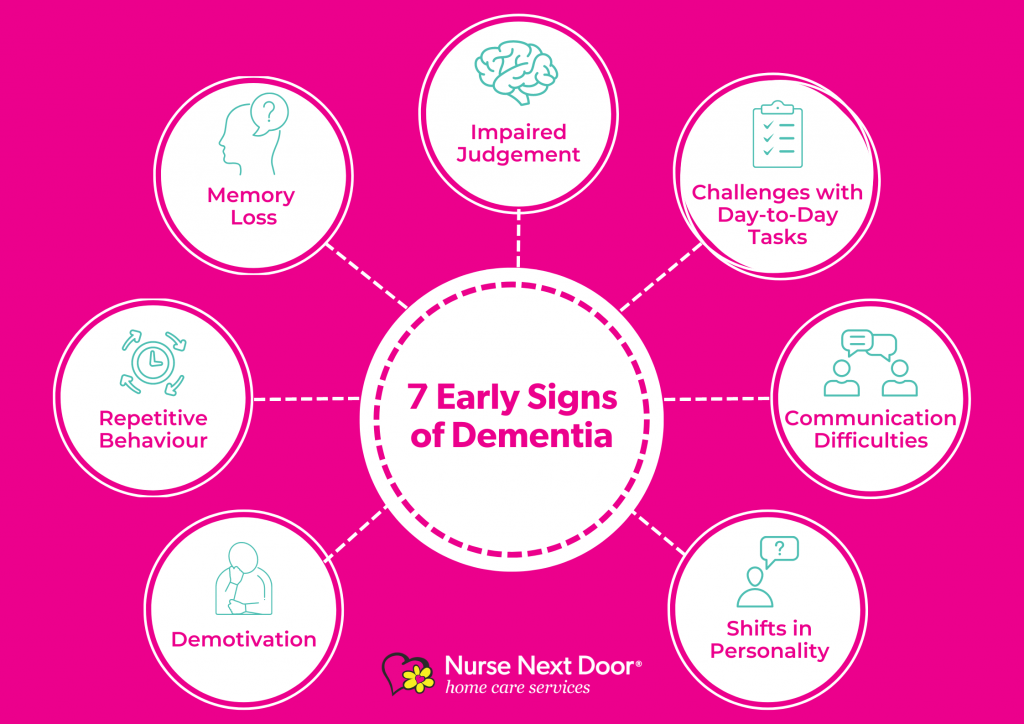Future Trends in Frontotemporal Dementia Treatment and Research
Understanding the Effect of Mental Deterioration on Every Day Life and Caregiving
Dementia impacts day-to-day life in profound methods, impacting not simply those identified yet also their caretakers. As cognitive decrease progresses, you may see changes in interaction and regular that challenge both parties.
The Phases of Mental Deterioration and Their Impacts on Day-to-day Live
As you navigate the journey of mental deterioration, understanding its stages can considerably affect just how you manage life. Mental deterioration generally proceeds through three primary phases: early, center, and late. In the very early phase, you might notice occasional memory gaps or trouble finding the ideal words. This can bring about aggravation, however identifying these signs early assists you adjust your regular and look for assistance.
Throughout the middle stage, you'll experience a lot more obvious cognitive decline. Daily jobs could come to be tough, and preserving your freedom may call for modifications. Making use of pointers and simplifying your atmosphere can aid.
In the late stage, people commonly need significant assistance with day-to-day tasks. Planning for care comes to be crucial, concentrating on comfort and lifestyle. By recognizing these phases, you're better furnished to respond proactively, guaranteeing you or your liked one can navigate the obstacles with self-respect and grace.

Changes in Communication and Social Interaction
How do adjustments in interaction impact your everyday interactions as mental deterioration advances? As dementia advances, you could observe that basic conversations become challenging.
You might discover it simpler to connect via these methods as opposed to relying only on spoken language. Listening abilities can likewise change; you could discover it harder to keep in mind or follow discussions what was just claimed (Early Onset Dementia). This can cause misconceptions or sensations of seclusion
Urging persistence and developing a supportive atmosphere can aid. Engaging in activities that foster connection, like music or art, can boost social interactions. Keep in mind, maintaining relationships is still possible; it's simply around adapting to new methods of connecting.
Effect On Daily Routines and Activities
While navigating everyday routines, you'll likely discover that jobs you once completed effortlessly ended up being extra challenging as dementia advances. Simple activities like food preparation, dressing, or even bathing might call for more effort and time. You might discover on your own neglecting actions in acquainted regimens or struggling to recall where you placed items. This can result in stress not just for you, but also for those around you.
Adapting your setting can assist; for circumstances, identifying items or making use of checklists can simplify jobs. Engaging in recurring, structured tasks can also give comfort and a sense of achievement. Remember, it's all right to ask for help.
Behavior and emotional Obstacles
Steering through everyday regimens can produce not simply useful obstacles, however additionally emotional and behavior ones. You might observe adjustments in state of mind, such as boosted anxiety or stress, which can come from confusion or difficulty in finishing jobs. As you navigate these moments, it is crucial to recognize that your liked one might reveal their sensations through habits like frustration or withdrawal.
These psychological reactions can be unforeseeable and might arise without warning, leaving you both feeling bewildered. You might discover that acquainted environments or regimens can help in reducing stress and anxiety, yet maintaining persistence ends up being substantial. It is important to verify their sensations, also if you do not totally recognize them.
The Role of Caregivers in Sustaining People With Mental Deterioration
As a caretaker, you play an important function in supplying psychological assistance for people with mental deterioration. Developing daily care regimens can develop a sense of security and comfort, helping to ease their anxiety. By comprehending their requirements and making use of efficient techniques, you can considerably improve their lifestyle.
Psychological Assistance Methods
When caring for a person with dementia, understanding the psychological landscape is vital for providing efficient support. Straightforward motions, like holding their hand or preserving eye call, can produce a feeling of safety. Ultimately, do not forget to take treatment of your very own emotional demands; seeking assistance for yourself can improve your capacity to care for them.
Daily Care Routines
Establishing daily treatment routines is essential for offering security and comfort to individuals with mental deterioration, as these routines can help in reducing confusion and anxiety. You can begin by outlining a constant timetable for dishes, activities, and rest. This predictability helps your liked one feel extra protected and involved.
Incorporate familiar tasks, like folding washing or watering plants, which can evoke positive memories and foster a sense of success. Usage aesthetic hints, such as schedules or checklists, to direct them via the day.
Be versatile, though; adjust regimens as required based on their mood or energy levels. Vascular Dementia. Remember, your patience and understanding are important in navigating their transforming demands, guaranteeing they really feel supported and valued throughout their life
Producing a Safe and Comfy Living Setting
Creating a risk-free and comfortable living atmosphere is essential for individuals with dementia. You'll wish to make home security adjustments that lower threats and assure knowledge to supply a feeling of convenience. By concentrating on these aspects, you can help produce a space that sustains both safety and security and health.
Home Safety And Security Alterations
As you browse the challenges of mental deterioration, making home safety and security alterations can substantially boost comfort and safety and security. Begin by removing tripping risks like rugs and clutter, ensuring sidewalks are clear. Set up grab bars in bathrooms and non-slip mats in the shower to avoid falls. Take into consideration making use of brighter illumination and evening lights to enhance presence, particularly throughout nighttime. Tag vital locations, such as the restroom and cooking area, with clear indications to aid with alignment. Safeguard any kind of sharp things or poisonous materials unreachable. Furthermore, assess your home's locks and alarm systems to verify they're easy to use and offer assurance. These adjustments not just advertise safety and security however additionally motivate self-reliance, allowing your enjoyed one to feel even more comfortable in their setting.
Comfort and Experience
After ensuring a safe environment with needed modifications, fostering convenience and knowledge is necessary for individuals with mental deterioration. Keep a regular regular to aid them really feel grounded and reduce anxiety. Engaging in familiar tasks, such as paying attention to songs or horticulture, can boost their feeling of belonging, making their living atmosphere a real refuge.
Strategies for Effective Caregiving and Assistance
While maneuvering the challenges of dementia treatment can really feel frustrating, carrying out reliable methods can considerably improve both the caregiver's and the patient's day-to-day experience. Begin by establishing a regimen; predictability assists lower stress and anxiety for both you and your loved one. Usage clear, easy interaction-- direct concerns and short sentences can stop confusion.

Do not forget to take care of on your own; timetable breaks and attach with support teams. Sharing experiences with others in similar circumstances can supply useful insights and emotional relief.
Finally, stay person and versatile. Dementia can bring uncertain modifications, so adapting your approach is essential. By employing these approaches, you can promote a more favorable atmosphere that profits both you and your liked one.
Frequently Asked Inquiries

What Are the Various Kinds of Mental Deterioration?
You'll discover a number of kinds of dementia, including Alzheimer's, vascular dementia, Lewy body mental deterioration, and frontotemporal mental deterioration. Each type impacts memory and cognitive function in a different way, so comprehending the distinctions is important for proper diagnosis and treatment.
Just How Can I Assist A Person With Early-Stage Dementia?
You can assist somebody with early-stage mental deterioration by being person, using assistance, and motivating them to engage in tasks they appreciate. Maintaining routines consistent and keeping open communication can likewise make a significant distinction in their every day life.
Are There Financial Resources Available for Dementia Treatment?
Yes, there are funds readily available for mental deterioration care. You can discover entitlement program programs, not-for-profit companies, and insurance options. It's additionally smart to consult neighborhood companies for specific sources tailored to your scenario.
What Legal Factors To Consider Should Caregivers Recognize?
As a caregiver, you need to Frontotemporal Dementia think about power of lawyer, health care proxies, and guardianship laws. It's important to understand the lawful rights and duties you hold, ensuring your enjoyed one receives ideal treatment and defense.
How Can I Handle Caregiver Anxiety?
You can deal with caretaker stress by prioritizing self-care, looking for support from groups or friends, setting practical expectations, taking breaks, and practicing leisure techniques. Keep in mind, your health matters equally as much as the person you're looking after.
Understanding the Effect of Mental Deterioration on Daily Life and Caregiving.
As you browse the journey of mental deterioration, recognizing its stages can noticeably influence how you handle day-to-day life.While maneuvering daily routines, you'll likely observe that jobs you once completed effortlessly ended up being extra tough as dementia progresses.Establishing everyday treatment regimens is crucial for providing stability and comfort to individuals with mental deterioration, as these regimens can aid reduce confusion and stress and anxiety.While navigating the obstacles of mental deterioration treatment can really feel frustrating, applying reliable strategies can considerably boost both the caretaker's and the patient's daily experience.